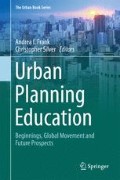Abstract
The training of city and regional planners in Africa has historically been influenced by the varied colonial constructs of what planning is, and what it should do. A control-oriented conception of planning together with ill-founded assumptions of the institutional capacity of the state has had profound influences on what happens in the lecture hall and beyond. In this chapter we reflect on the evolution of the Association of African Planning Schools (AAPS), a network of over 50 planning schools on the Continent, and its efforts to revitalize planning education. Following a discussion of the three dimensions of its work (communication, working on shared projects and events), we focus how AAPS work engaged in partnerships with organizations external to the network. The notion of ‘knowledge networks’ is central to understanding this phase of AAPS’s work. Connections with like-minded organizations, which operate at regional and global scales, have assisted with learning and exchange of ideas. The most important of these has been the global exposure through memberships of GPEAN (Global Planning Education Association Network), joint curricular initiatives, and Memoranda of Understanding (MoUs) with SDI (Slum Dwellers International) and WIEGO (Women in Informal Employment Globalizing and Organizing) and more recently, partnership with the GLTN (The Global Land Tools Network) of UN-Habitat. Expanding AAPS’s work beyond the confines of its membership has enabled access to further funding, new projects, and extending its sphere of influence beyond the educational realm. This is critical in ensuring that curricula reform is accompanied by policy shifts and innovative practice.
Access this chapter
Tax calculation will be finalised at checkout
Purchases are for personal use only
Notes
- 1.
Issues tabled in a symposium on African universities and published in Social Dynamics 33 (1) 2006.
References
African Union (2015) Draft summary framework for an African common position on habitat III (ACPH3). http://www.auhf.co.za/wordpress/assets/Draft-Summary-Framework-for-African-Common-Position-on-Habitat-III.pdf. Accessed 2 Sept 2016
Association of African Planning Schools (2016) WIEGO collaboration. http://www.africanplanningschools.org.za/networks/wiego-collaboration. Accessed 2 Sept 2016
Chari S, Colbridge S (eds) (2008) The development reader. Routledge, Abingdon
Devas N, Rakodi C (1993) Planning and managing urban development. In: Rakodi C (ed) Managing fast growing cities. Longman, Harlow, pp 41–62
Diaw K, Nnkya T, Watson V (2002) Planning Education in Sub-Saharan Africa: responding to the demands of a changing context. Plan Pract Res 17(3):337–348
Duminy J (2010) Planning education in Africa. Paper presented at the AAPS conference on revitalising planning education in Africa, Dar es Salaam, 5–8th October
Escobar A (1997) The making and the unmaking of the third world through development. In: Rahnema M, Bawtree V (eds) The post-development reader. Zed Books, London, pp 85–93
Henry L, Mohan G, Yanacopulos H (2004) Networks as transnational agents of development. Third World Q 25(5):839–855
Mabogunje AL (1994) Overview of research priorities in Africa. In: Stren R (ed) Urban research in the developing world, vol 2: Africa. Centre for Urban and Community Studies, Toronto
McFarlane C (2009) Translocal assemblages: space, power and social movements. Geoforum 40:561–567
Njoh AJ (2009) Urban planning as a tool of power and social control in colonial Africa. Plan Perspect 24(3):301–317
Odendaal N (2012) Reality check: planners education in the African urban century. Cities 29(3):174–182
Odendaal N, Duminy J, Inkoom D (2015) The developmentalist origins and evolution of planning education in Sub-Saharan Africa, c1940 to 2010. In: Da Silva C (ed) Urban planning in Sub-Saharan Africa: colonial and postcolonial planning cultures. Informa, New York
Parnell S, Pieterse E (eds) (2014) Africa’s urban revolution. Zed Books, London and New York
Rakodi C (2003) Politics and performance: the implications of emerging governance arrangements for urban management approaches and information systems. Habitat Int 27:523–547
Sawyer A (2004) Challenges facing African universities: selected issues. Association of African Universities, Accra, Ghana
Spooner S (2015) Africa defies urbanisation norms seeks to create its own path. MG Africa. http://mgafrica.com/article/2015-12-01-africa-defies-urbanisation-norms-seeks-to-create-its-own-path. Accessed 9 Dec 2015
Watson V (2011) Changing planning law in Africa: an introduction to the issue. Urban Forum 22:203–208
Watson V, Odendaal N (2013) Changing planning education in Africa: the role of the association of African planning schools. J Plan Educ Res 33:96–107
Author information
Authors and Affiliations
Corresponding author
Editor information
Editors and Affiliations
Rights and permissions
Copyright information
© 2018 Springer International Publishing AG
About this chapter
Cite this chapter
Odendaal, N., Watson, V. (2018). Partnerships in Planning Education: The Association of African Planning Schools (AAPS). In: Frank, A., Silver, C. (eds) Urban Planning Education. The Urban Book Series. Springer, Cham. https://doi.org/10.1007/978-3-319-55967-4_10
Download citation
DOI: https://doi.org/10.1007/978-3-319-55967-4_10
Published:
Publisher Name: Springer, Cham
Print ISBN: 978-3-319-55966-7
Online ISBN: 978-3-319-55967-4
eBook Packages: Earth and Environmental ScienceEarth and Environmental Science (R0)

